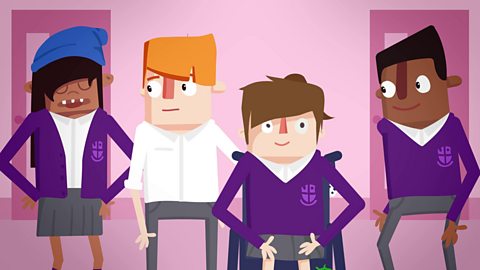LUCAS:Oh! I hate maths!
MINI-LUCAS:That's because you're rubbish at it!
LUCAS:Another dumb maths problem to solve.
MEESHA:I kind of like doing these!
MINI-LUCAS:Get ready to crash and burn Lucas!
MINI-LUCAS (CONT):Oh! You can't do this! It's too hard!
MINI-LUCAS (CONT):Mayday! Mayday! Dive for cover!
LUCAS:This is so easy, it's boring!
MEESHA:Really? I think it's hard!
MINI-MEESHA:Woah! Come on Meesha!
MINI-MEESHA (CONT):Give it your best shot!
MINI-LUCAS:Argh! You'll never do this!
MINI-LUCAS (CONT):Oh, What's the point!
(BELL RINGS)
MEESHA:Did you manage it?
LUCAS:Dead easy.
MEESHA:Really?
LUCAS:Hmph.
LUCAS:Urgh!
MINI-LUCAS:You can see the answers. Go on, copy them!
LUCAS:Hmmm.
LUCAS (CONT):I wasn't looking.
MEESHA:Ha! Yes you were! I used to copy when I thought I was no good at maths.
LUCAS:Hey! That's not
LUCAS (CONT):Urgh.
LUCAS (CONT):Yeah, OK. I was copying. But I'm rubbish at Maths. Always have been, always will be.
MEESHA:If you believe that you'll stay rubbish. Like FOREVER!
MEESHA (CONT):Look, at my last school they taught me to stop thinking I couldn't do it and start thinking I COULD do it; change your mindset, they said.
LUCAS:Huh! That's dumb. How can you change how you think?
MEESHA:You choose to. If you believe you'll never be any good at maths, that means you have a fixed mindset, so you don't even try.
MEESHA (CONT):But - you can choose to have a growth mindset instead.
LUCAS:What's a growth mindset?
MEESHA:It's when believe you CAN get better at maths. And you have a go!
LUCAS:Huh 
MINI-LUCAS:OK. Let's try a different way. Have a go! Oh!Maybe maybe you can
LUCAS:Argh! Just when I thought I was getting somewhere.
MEESHA:Just give it a go!
MINI-LUCAS:Oh! Oh, What's the point? It's WAY too hard! You can't do this!
LUCAS:Stop! I can do this!
MINI-LUCAS:Don't panic. Find a way through.
LUCAS:Hmmm.
MINI-LUCAS:Yes! You did it!
MINI-LUCAS:Get in!
LUCAS:Phew!
MEESHA:Look! Miss has put the answers on the board.
LUCAS:I got five out of ten.
MEESHA:That's awesome.
LUCAS:ThatÔÇÖs five more than I thought IÔÇÖd get.
MEESHA:Did you change your mindset?
LUCAS:I guess I did! I never thought I could get better at maths but I CAN!
LUCAS (CONT):How did you do?
MEESHA:I got eight.
LUCAS:Nice one! Maybe I can get eight next time, if I keep working at it.
LUCAS:I didn't realize changing my mindset would make me feel so good.
MEESHA:You can use it for everything.
MEESHA:I don't think I can do it.
LUCAS:(teasing)Then change your mindset!
MEESHA:Here I go! Woo-hoo!
Video summary
Meesha and Lucas are in a maths lesson.
Meesha is happy to take on the challenges set by the teacher, but Lucas is more reluctant.
Meesha has a growth mindset. She believes intelligence, talent and ability are open to change.
So she believes she can get better at maths. This means she tries, puts in effort and works hard to master the learning.
Lucas has a fixed mindset. He doesn't believe he can get better at maths.
He thinks you're either good at maths or your not. And he is definitely not good at maths.
Lucas and Meesha make different decisions about their learning because of their different mindsets.
As time goes on, Meesha and Lucas talk. Meesha explains that you can change your mindset - and she encourages Lucas to do this. Gradually, Lucas starts to think in a different way.
He starts to think that he can do maths, that he can get better. As he changes his mindset, so Lucas changes his behaviour. He starts to have a go, to keep trying and to persist.
We see him improve his maths skills as a result. Meesha and Lucas demonstrate the differences between a growth mindset and a fixed mindset.
They show how each one influences your thoughts, actions and behaviours.
And they also show that anyone can develop a growth mindset, no matter who they are.
This is from the series: Growth Mindset.
Teacher Notes
This could be used as an introduction to growth mindsets and a fantastic tool for helping learners reflect on how they think about learning and their own potential to develop.
This clip is suitable for teaching PSHE/Modern Studies at KS2 in England, Wales and Northern Ireland and 1st and 2nd Level in Scotland.
What is a good mistake? video
An animated clip exploring how to think positively about making mistakes.

How your mindset can affect your approach to challenges. video
An animated clip exploring the difference between a growth mindset and a fixed mindset.

╠²